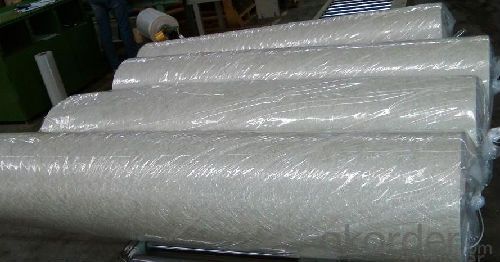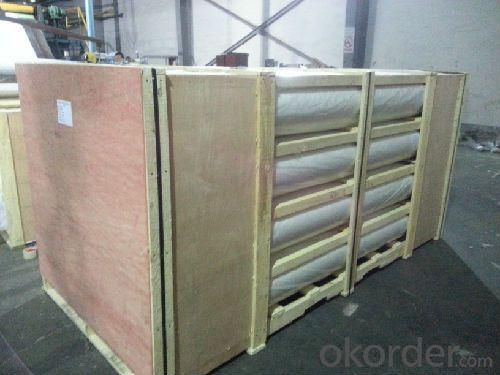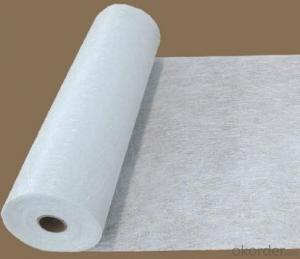C Glass Fiber Chopped Strand Mat for FRP TanK,FRP Panel
- Loading Port:
- Shanghai
- Payment Terms:
- TT OR LC
- Min Order Qty:
- 4000 kg
- Supply Capability:
- 200000 kg/month
OKorder Service Pledge
OKorder Financial Service
You Might Also Like
Introduction of E-glass Chopped Strand Mat
Chopped strand mat is made from fiberglass chopped strands boned with powder binder or emulsion binder.
This products ischaracterized bg good combination of resin,easg operation ,good wet strengthretention,good laminate transparency
Chopped strand mat is used primarily for hand lay-up processes, filament winding and press molding of FRP products. Typical products include bathroom
accessories, pipe, building materials, automobiles, furniture and other FRP products.
Features of E-glass Chopped Strand Mat
1.Warp and weft rovings aligned in a parallel,flat manner and uniform tension .
2.Densely alighed fibers,providing high dimensional stability ans easy handing .
3.Good moldability,fast and complete resin wet-out ,enabling high productively .
4.Good transporsision and hign strength of the composite products.
5.Even thickness ,no fuzz ,no stain.
6.Fast wet-out ,products with high strength ,little loss for strength in damp situation.
Features of E-glass Chopped Strand Mat
1.the composit products have high dry and wet tensile strenth and good transparency.
2.Low fuzz ,dirt ,impurity and other stain
Images of E-glass Chopped Strand Mat


E-Glass Chopped Strand Mat Specification:
Property | Glass type | Weight(g/m2) | Width 200~3300 | Roll Weight | Moisture Content /% | Combustible Content /% | Breakage Strength /N |
Test Method | GB/T 1549 | ISO3374:2000 | ISO3374 | GB/T17470-1998 | ISO3344:1997 | ISO1887:1995 | ISO3342 |
EMC 80 | E-GLASS | 80±16 | ±5 | 6~50 | <0.2< span=""> | 13.6±0.35 | ≥200 |
EMC 100 | E-GLASS | 100±10 | ±5 | 6~65 | <0.2< span=""> | 9.5±0.35 | ≥170 |
EMC 150 | E-GLASS | 150±15 | ±5 | 6~97 | <0.2< span=""> | 8.0±0.35 | ≥40 |
EMC 225 | E-GLASS | 225±22 | ±5 | 6~150 | <0.2< span=""> | 5.0±0.6 | ≥60 |
EMC 300 | E-GLASS | 300±30 | ±5 | 6~180 | <0.2< span=""> | 4.0±0.6 | ≥90 |
EMC 450 | E-GLASS | 450±45 | ±5 | 6~180 | <0.2< span=""> | 3.8±0.6 | ≥120 |
EMC 600 | E-GLASS | 600±60 | ±5 | 6~240 | <0.2< span=""> | 3.6±0.6 | ≥150 |
EMC 900 | E-GLASS | 900±90 | ±5 | 6~190 | <0.2< span=""> | 3.4±0.6 | ≥180 |
FAQ of Chopped strand mat
1. Why Choose us?
CNBM is a stated own company, provide the guarantee for the best quality, best service and safety business.
2. How will we guarantee the quality?
a, ISO 9001-2008 quality control system;
b, Strict and regular quality control in production;
c, Inspeciation when loading into container before shippment;
d, Sample stock for one year for quality tracing and record.
3. What is your MOQ?
Our MOQ is one pallet.
4. Can you provide sample?
Yes, samples are in stock. we can offer free sample for you.
5. Payment terms?
We can accept L/C, T/T etc.
6. Do you offer OEM service?
Yes, we can print customers’ logo on the packaging;
And the size and specification can be produced and design according to your demand.
- Q:Is fiberglass mat tissue resistant to mold and mildew?
- Yes, fiberglass mat tissue is resistant to mold and mildew due to its non-porous and moisture-resistant properties.
- Q:Can fiberglass mat tissue be used for thermal insulation?
- No, fiberglass mat tissue is not typically used for thermal insulation. It is primarily used for reinforcing and providing strength to composite materials such as fiberglass sheets or panels. For thermal insulation purposes, other materials such as mineral wool, foam, or cellulose insulation are commonly used.
- Q:Can fiberglass mat tissue be used for reinforcing fiberglass boats?
- Yes, fiberglass mat tissue can be used for reinforcing fiberglass boats. Fiberglass mat tissue is a non-woven material made up of randomly oriented fiberglass strands held together by a binder. It is lightweight, flexible, and easy to work with, making it an ideal choice for reinforcing fiberglass boats. When used in boat construction, fiberglass mat tissue is typically used in conjunction with fiberglass resin to create a strong and durable composite material. The mat tissue is laid down and impregnated with resin, which then cures and hardens to form a rigid structure. This process helps to increase the strength, stiffness, and impact resistance of the boat. Fiberglass mat tissue is commonly used in areas that require additional reinforcement, such as the hull, deck, or other high-stress areas. It helps to distribute and absorb forces, reducing the risk of cracking or failure. Additionally, it can provide added protection against impacts and abrasions, helping to prolong the lifespan of the boat. However, it is important to note that fiberglass mat tissue alone may not be sufficient for reinforcing fiberglass boats. It is often used in combination with other reinforcement materials, such as fiberglass cloth or woven roving, to provide a balanced and optimized reinforcement system. Ultimately, the use of fiberglass mat tissue for reinforcing fiberglass boats can greatly enhance their structural integrity and durability. It is a versatile and cost-effective option that is widely used in the boat building industry.
- Q:What is the flexibility of fiberglass mat tissue?
- Fiberglass mat tissue possesses a remarkable quality known as flexibility, which grants it the capability to bend, conform, or shape itself to various forms or surfaces without succumbing to breakage or compromising its structural integrity. The distinct characteristics of fiberglass, such as its exceptional strength-to-weight ratio and dimensional stability, allow the mat tissue to retain its flexibility while upholding its robustness and longevity. This adaptability endows fiberglass mat tissue with versatility, rendering it suitable for an extensive array of applications spanning from automotive components and construction materials to boat manufacturing. Furthermore, the flexibility of fiberglass mat tissue facilitates effortless cutting, shaping, or layering to meet specific design specifications or seamlessly integrate into intricate or curved surfaces.
- Q:Can fiberglass mat tissue be used for roofing applications?
- Yes, fiberglass mat tissue can be used for roofing applications. Fiberglass mat tissue is a lightweight and flexible material that is commonly used in the construction industry for various purposes, including roofing. It is often used as a reinforcement layer in roofing systems to enhance their strength and durability. The fiberglass mat tissue is typically impregnated with bitumen or other waterproofing agents to create a water-resistant barrier on the roof. It also helps to improve the fire resistance and thermal insulation properties of the roof. Moreover, fiberglass mat tissue is resistant to mold, mildew, and other common roofing issues, making it an ideal choice for roofing applications.
- Q:Is fiberglass mat tissue suitable for wind energy applications?
- Yes, fiberglass mat tissue is suitable for wind energy applications. It is commonly used as a reinforcement material in wind turbine blades due to its high strength-to-weight ratio, excellent fatigue resistance, and ability to withstand harsh environmental conditions. The fiberglass mat tissue enhances the structural integrity and durability of the blades, enabling them to efficiently capture wind energy and sustain long-term operation.
- Q:Is fiberglass mat tissue suitable for HVAC insulation?
- Yes, fiberglass mat tissue is suitable for HVAC insulation. Fiberglass mat tissue is a lightweight and flexible material that is commonly used in insulation applications due to its excellent thermal insulation properties. It provides effective heat insulation, helping to maintain a comfortable and energy-efficient environment within HVAC systems. Additionally, fiberglass mat tissue is resistant to moisture and does not promote the growth of mold or mildew, making it a suitable choice for HVAC insulation where condensation and moisture may be present. It is also easy to install and can be cut to fit around HVAC components, ensuring a proper and tight insulation seal. Overall, fiberglass mat tissue is a reliable and durable insulation material that is widely used in HVAC systems to enhance energy efficiency and thermal performance.
- Q:Does anyone know the hardness value of the heat conductive gasket? Does it contain the hardness of the carrier (glass fiber)?
- The hardness of the heat conducting gasket does not contain the hardness of the carrier glass fiber.
- Q:Is fiberglass mat tissue resistant to mildew and rot?
- Indeed, the resistance of fiberglass mat tissue to mildew and rot is undeniable. Crafted from delicate glass fibers interlaced to form a robust and enduring substance, fiberglass stands as a paragon. Its non-porous nature prevents moisture absorption, thus endowing fiberglass mat tissue with exceptional resistance against mildew proliferation and rot-induced decomposition. Moreover, fiberglass often receives protective coatings or additives that amplify its fortitude against these biological detriments. For this reason, fiberglass mat tissue emerges as an exemplary selection in settings where humidity or moisture pose a threat, such as bathrooms, outdoor structures, or regions prone to elevated humidity levels.
- Q:What is the delamination strength of fiberglass mat tissue?
- The ability of fiberglass mat tissue to resist the separation or detachment of its layers, known as delamination strength, is influenced by various factors. These factors include the quality of the resin used, the thickness and density of the mat, and the manufacturing process. To ensure durability and structural integrity, fiberglass mat tissue is typically designed with a high delamination strength. It is composed of multiple layers of glass fibers held together by a binder or resin. The bonding between these layers is crucial in preventing delamination. Various testing methods, such as the peel test, can determine the delamination strength of fiberglass mat tissue. This test measures the force required to separate the layers and provides valuable information about the adhesive strength between them, helping to assess the material's overall quality. The delamination strength may vary depending on the specific application and requirements. Different industries, such as construction, automotive, marine, and aerospace, may have different delamination strength specifications for their fiberglass mat tissue. Manufacturers typically provide technical data or specifications indicating the delamination strength of their products. It is important to consider external factors that can influence the delamination strength of fiberglass mat tissue, such as exposure to extreme temperatures, moisture, or chemical substances. Proper installation, maintenance, and adherence to recommended usage guidelines are crucial in maintaining the desired delamination strength and overall performance of the material.
1. Manufacturer Overview |
|
|---|---|
| Location | |
| Year Established | |
| Annual Output Value | |
| Main Markets | |
| Company Certifications | |
2. Manufacturer Certificates |
|
|---|---|
| a) Certification Name | |
| Range | |
| Reference | |
| Validity Period | |
3. Manufacturer Capability |
|
|---|---|
| a)Trade Capacity | |
| Nearest Port | |
| Export Percentage | |
| No.of Employees in Trade Department | |
| Language Spoken: | |
| b)Factory Information | |
| Factory Size: | |
| No. of Production Lines | |
| Contract Manufacturing | |
| Product Price Range | |
Send your message to us
C Glass Fiber Chopped Strand Mat for FRP TanK,FRP Panel
- Loading Port:
- Shanghai
- Payment Terms:
- TT OR LC
- Min Order Qty:
- 4000 kg
- Supply Capability:
- 200000 kg/month
OKorder Service Pledge
OKorder Financial Service
Similar products
New products
Hot products
Related keywords



























